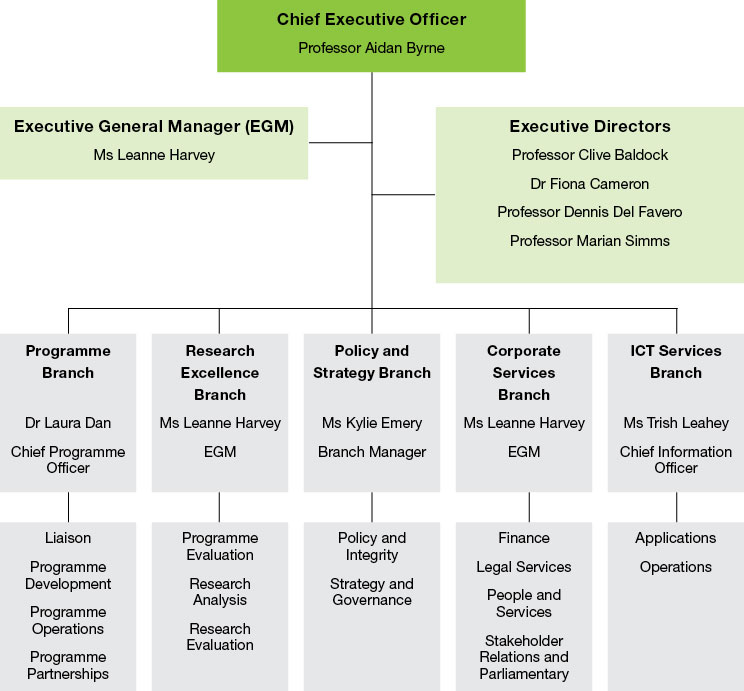History
The ARC was established as an independent Commonwealth entity in July 2001. Historically however, the funding schemes administered by the ARC have been in existence for much longer. The Australian Research Grants scheme, for example, was the original precursor of today’s Discovery Projects scheme, and was first established in 1965.
Legislation
The ARC is established under the Australian Research Council Act 2001 (ARC Act).
The Act provides details in relation to:
- the function of the ARC
- the establishment of designated committees
- the Chief Executive Officer and ARC staff
- reporting requirements
- funding of research including the funding cap, funding assistance, funding rules and ARC research endowment fund
- other miscellaneous requirements including delegations.
The ARC Act is normally updated annually through an amendment bill which allows continued funding under the National Competitive Grants Programme (NCGP).
Role and functions
The ARC administers the NCGP, has responsibility for Excellence in Research for Australia (ERA), and advises the Australian Government on research matters.
Administering research funding schemes
Through the NCGP the ARC supports excellent research and research training across all disciplines. The NCGP comprises two programmes—Discovery and Linkage—under which the ARC funds a range of complementary schemes that provide funding for basic and applied research, research training, research collaboration and infrastructure. Funding is awarded on the basis of a competitive peer review process.
Administering research evaluation frameworks
The ARC supports the growth of knowledge and innovation by administering two evaluation frameworks to assess the quality, engagement and impact of research.
ERA is an established research quality assessment framework that measures and reports on the quality of research conducted at Australia’s higher education institutions. It provides a national stocktake of discipline-level areas of research strength and areas where there is opportunity for development across the full spectrum of research activity.
The ARC is also developing an engagement and impact assessment that will run in conjunction with the existing ERA framework. The engagement and impact assessment will assess the engagement of university researchers with end-users, and the benefits of Australia’s investment in university research by showing how universities are translating their research into economic, social, environmental and other impacts.
Providing advice on research matters
The ARC is responsible for providing policy advice to the responsible Minister about matters related to research, including: research and research training, research partnerships and the quality of research in Australia.
Stakeholders
The ARC’s key stakeholders are the Australian Government, Australian universities, partner organisations (including industry, government, not-for-profit, business and international education), publicly funded research agencies, research peak bodies, the global research sector, and Australian taxpayers.
Within the Australian Government, the ARC works closely with the National Health and Medical Research Council (NHMRC) on a range of research matters including administration of competitive granting schemes, review of the Australian Code for the Responsible Conduct of Research, and administration of the Australian Research Integrity Committee. While the ARC funds research across all disciplines (with the exception of clinical medicine) the NHMRC provides funding for all areas of research relevant to human health and medicine. The ARC also works closely with its portfolio agency, the Department of Education and Training, as well as the Department of Industry, Innovation and Science.
Organisational structure
The structure of the ARC at 30 June 2016 is illustrated in Figure 1.1.
Figure 1.1: Structure of the ARC (at 30 June 2016)

Performance framework
Outcome and Programmes 2015–16
The ARC has one Outcome and three Programmes (Portfolio Budget Statements (PBS) 2015–16).
Figure 1.2: ARC Outcome and Programmes, 2015–16
|
Outcome |
1 |
|
Growth of knowledge and innovation through managing research |
|
Programmes |
1.1 |
1.2 |
1.3 |
|
Discovery–research |
Linkage–cross-sector |
Excellence in |
Purposes 2015–16
As outlined in the ARC Corporate Plan 2015–16 to 2017–18 the ARC has three purposes: managing research funding schemes, measuring research excellence; and providing advice.
These purposes and their associated performance measures align with the programmes and performance measures outlined in the 2015–16 PBS. A mapping between the two documents is provided in Table 2.1 (page 16).
Developments during 2015–16
In 2015–16:
- as part of the Additional Budget Estimates processes in February 2016, Programme 1.3 ERA was expanded to include ‘development and conduct of an engagement and impact assessment’ (see page 65 for additional information)
- the ARC had implemented a continuous application and assessment process under the Linkage Projects scheme to commence 1 July 2016
- the ARC continued to develop its performance measurement framework (including performance criteria and targets) in line with the new requirements for planning and reporting under the Public Governance, Performance and Accountability Act 2013. Further work on the framework will be undertaken during 2016–17.